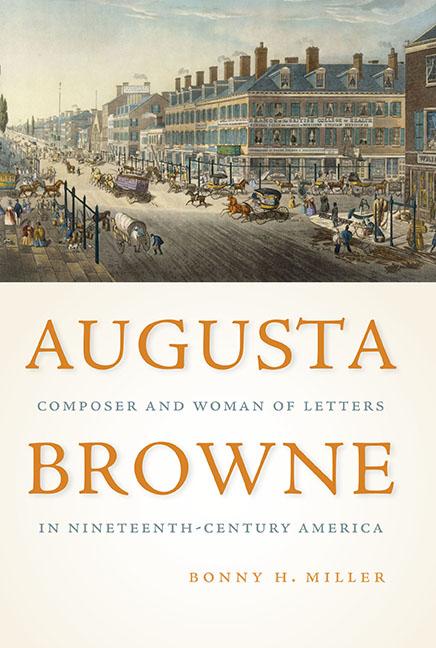Book contents
- Frontmatter
- Contents
- List of Illustrations
- Preface
- Acknowledgments
- Introduction
- 1 First Steps
- 2 Apprentice in a Family Music Business
- 3 Philadelphia Debut
- 4 A Young Professor of Music
- 5 A New Leaf
- 6 Her Own Woman
- 7 Courtship and Consequences
- 8 Pilgrim in Progress
- 9 “Glad Fruition”
- 10 Legacy in Music
- 11 Legacy in Literature
- 12 Contributions to Music Journalism
- 13 A Legacy Written into History
- Appendixes
- Appendixe 1 Children and Descendants of David Samuel Browne and Elizabeth Montgomery Browne
- Appendixe 2 Chronology of Augusta Browne’s Music and Letters
- Appendixe 3 List of Musical Works
- Appendix 4 Selected Glossary
- List of Abbreviations
- Notes
- Selected Bibliography
- Index
8 - Pilgrim in Progress
Published online by Cambridge University Press: 23 October 2020
- Frontmatter
- Contents
- List of Illustrations
- Preface
- Acknowledgments
- Introduction
- 1 First Steps
- 2 Apprentice in a Family Music Business
- 3 Philadelphia Debut
- 4 A Young Professor of Music
- 5 A New Leaf
- 6 Her Own Woman
- 7 Courtship and Consequences
- 8 Pilgrim in Progress
- 9 “Glad Fruition”
- 10 Legacy in Music
- 11 Legacy in Literature
- 12 Contributions to Music Journalism
- 13 A Legacy Written into History
- Appendixes
- Appendixe 1 Children and Descendants of David Samuel Browne and Elizabeth Montgomery Browne
- Appendixe 2 Chronology of Augusta Browne’s Music and Letters
- Appendixe 3 List of Musical Works
- Appendix 4 Selected Glossary
- List of Abbreviations
- Notes
- Selected Bibliography
- Index
Summary
As we have seen, Victorian conventions of mourning curtailed Augusta Browne Garrett's teaching and public life at the peak of her activities. A widow in her forties without wealth or power warranted courtesy but little attention. It has been said that a man dies once, but a woman dies twice— the first time at her marriage, the second at her demise. In nineteenth-century America, a widow died yet again when her identity shifted from partner to leftover. Widows often experienced limited financial resources and became ever more reliant on others. As Augusta struggled to regain professional momentum, the escalating Civil War drastically altered her everyday life. Her brothers—two surviving of the original six—rose to the Union cause and soon departed to fight in the New York State volunteer infantry.
The burden of family care fell squarely on Augusta and Sarah Morrow, their trusted housekeeper, during these troubled months. The house on Adams Street grew empty and fraught with anxiety following the departure of her brothers. During autumn, an ad announced that the composer was to “resume lessons in Pianoforte playing, and in harmony and singing.” She also solicited for a church position, writing, “Mrs. Garrett, having had the unusual advantage of being specially educated in Organ playing and in Classical Church Music, and having been organist in several churches, would be pleased to enter into an engagement with any church possessing a fine instrument.” It is uncertain whether Augusta found a position in Brooklyn at this time, but as the war progressed and men were called to the front through enlistment or the draft, more church openings became available.
William Henry Browne was in his mid-thirties, a bachelor with previous military experience in the Mexican War. Louis Henri Browne was close to fifty, with a wife and young daughter in Boston. He was a skilled piano builder who held several patents in piano construction. Louis may not have shared his younger brother's fervor for the military life, but he served staunchly alongside him. William Henry chafed to combat the “traitors and disunionists from East to South,” as Augusta described the enemy.
- Type
- Chapter
- Information
- Augusta BrowneComposer and Woman of Letters in Nineteenth-Century America, pp. 160 - 184Publisher: Boydell & BrewerPrint publication year: 2020



